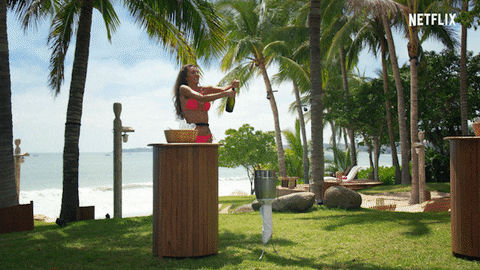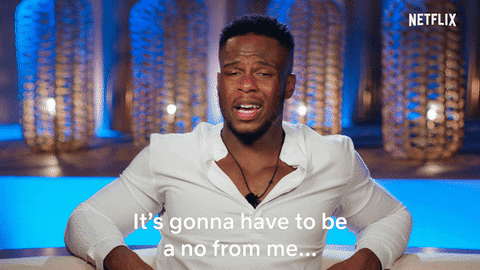Picture this: A group of attractive, noncommittal singles are whisked away to a tropical destination and are forbidden to have sexual contact — or they’ll risk losing $100,000. The ultimate goal is that they’ll experience “personal growth” and form more “meaningful” relationships.
As a therapist I’ll dive into the minds of these contestants, exploring themes like emotional intimacy, self-talk, attachment and more in Too Hot to Handle.
Spoiler Alert: I’ll comment on contestants without giving away too much!
Self-Talk & Frontal Lobes
Too Hot to Handle made fun of itself before anyone else could as Desiree Burch, comedian, voiced over the show with sarcastic comments. The commentary reminded me of self-talk, or the internal monologue that runs through the conscious mind each day. Unregulated negative self-talk can contribute to mental illnesses like anxiety and depression. The second omnipresent, omniscient entity in the show was “Lana,” or the Big-Brother-esque surveillance that tracked “right” and “wrong.” This robot partly functioned as the contestants’ frontal lobe, or area of the brain responsible for executive functions like judgment, planning, and problem-solving. Its functions also balance the id, or the unconscious part of the mind based on pleasure and instant gratification.

Photo: Netflix
Contrived “Personal Growth“
The emotional transformation that Too Hot to Handle hoped for was strained. While activities that involved emotional expression, self-reflection, and positive affirmations were all great ideas, they seemed to fall short in execution. As a therapist, some of the activities they used were similar to ones I’ve used in group counseling settings. While participating in these exercises can be therapeutic, it’s unlikely that they’ll instantly be life-changing. Growth is a process that can require consistent effort over a long period of time. Also, I noticed cultural appropriation in more than one self-growth workshop. What’s with the West using Eastern practices to make things sound more interesting? It needs to stop.

Emotional Intimacy: A Dying Art Form
The contestants were supposedly chosen due to their fear of commitment and emotional intimacy in relationships. If you struggle with emotional intimacy and want to improve, don’t lose hope! These are some building blocks to consider:
- Vulnerability: Can you share your honest emotions?
- Healthy Communication: Do you listen to each other?
- Trust: Do you have each other’s backs?
- Acceptance: Can you be authentic with each other?
Practicing emotional vulnerability may be challenging at first but it’ll get easier with time.

Photo: Netflix
Attachment & Relationships
Your attachment style influences your partner selection, how well your relationships progress, and also how they end. While many in their early twenties go through various romantic relationships before finding their life partner, the fear of commitment in these contestants is worth unpacking. Most contestants seemed to have an avoidant attachment style, or one that fears commitment, avoids emotional intimacy, and always has an “escape route.” When faced with intimacy, avoidant-types complain about feeling “suffocated” and may distance themselves further. Being mindful of your attachment style can help you understand your strengths and vulnerabilities in a relationship.

Photo: Netflix
Step Into My Office…
I have an idea of what we’d work on together in therapy:
- Sharron: You referred to the “new” Sharron as more emotionally available. Let’s use the empty chair technique to speak with “old” Sharron and reflect on the growth you’ve experienced.
- Francesca: I noticed that you commented on extreme anxiety whenever Lana would speak. Let’s use CBT (cognitive behavioral therapy) and grounding techniques to help you better regulate your anxious thoughts.
- David: You seemed a bit confused with what you want out of a partner (aside from having a good “peach”). Let’s work on identifying your values so we can gain clarity on what you’d value in a partner.
- Chloe: I admire how you give 100% of your heart to people. Let’s explore emotional boundaries to find a healthy “gray area” between loving and hating someone.
- Harry: It seems like you avoid emotional intimacy by focusing on physical intimacy. Let’s work to uncover the roots beneath this.
- Bryce: I appreciated you sharing about your insecurities. Let’s focus on building your self-esteem by using positive self-talk and self-affirmation exercises.
- Nicole: You said you find it unattractive when men start falling in love with you too quickly. Let’s unpack this and explore what you’d ideally want from a partner.
- Rhonda: It’s understandable that you were anxious for your son to meet Sharron. Let’s use talk therapy and journaling to identify what qualities you’d want from Sharron as not only your partner but also as a father figure to your son.
- Matthew: I admire that you’re a deep- thinker. Let’s engage with ACT (acceptance and commitment therapy) to discover how your actions can better align with your values to further increase your self-awareness.
- Haley: I like how you confidently went against the grain. At the same time, there’s much to be gained from stepping out of your comfort zone. Let’s take small steps with with this.
- Kelz: Expressing your emotions doesn’t make you any less of a man. Let’s try implementing more “I statements” instead of “you statements.”
/cdn.vox-cdn.com/uploads/chorus_image/image/66667783/claire_toohotothandle_netflix_ringer.0.jpg)
Millennial Stereotypes
The premise of the show spoke to the stereotype that millennials are undisciplined, narcissistic, and non-committal. Sadly, in the age of online dating for quick hookups, concepts like monogamy, committed relationships, and emotional intimacy can be hard to find. Is sex with a stranger worth more than $100,000? Well, some of the contestants seem to think so. Also, this show’s popularity spoke volumes about the consumption of our society as a whole.

Quarantine Coping Skills
Too Hot to Handle made a timely debut while most people are quarantined due to the COVID-19 pandemic. The escape that reality TV offers can be viewed as a coping skill. I mean, who couldn’t use some brainless entertainment as a distraction from the terrifying state of the world?
Some questions to consider:
- How do you cope with uncomfortable emotions?
- Have you become dependent on certain behaviors?
- What’s one healthy coping skill that you can try?

Conclusion
While watching Too Hot to Handle felt like gorging on empty calories — filling yet not quite satisfying — it offered lots to unpack behind emotional vulnerability, communication, and honesty in meaningful relationships. In the era of social media and online dating, it demonstrated the reality that we’re become increasingly uncomfortable with authentic expression. My final verdict: If you need a new show to watch while quarantined — skip this one. You can find something better than watching people pretend they have no frontal lobes.
Interested in the psychology behind other Netflix shows? Check out my reviews of Tiger King: Murder, Mayhem and Madness, Love is Blind, and You.

I haven’t seen the show, but your review of it was highly entertaining! Brava!
LikeLiked by 1 person
You’re not missing much by not watching it, but I’m glad you liked my review, mom!
LikeLiked by 1 person